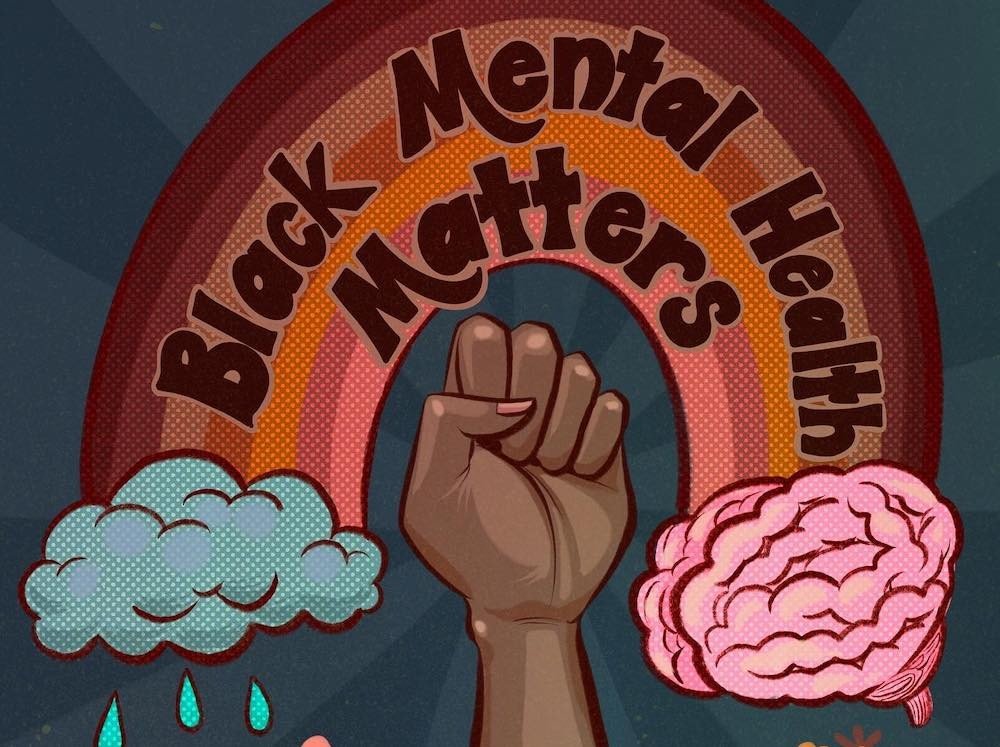Mental Health is important because it helps determine how we handle stress, relate to others, and make healthy choices. Mental Health is important at every stage in life, when we are kids to when we are old. Yet Black Men and their Mental Health is usually not treated with the same level of importance. Black Men are looked as weak when they speak about their mental health and the struggles they have with it, and this is wrong and a result of decades of racist practices used against Black People in this country. From dealing with the struggles of our community, constantly being looked upon as a threat or with being the only true source of strength for your family, We do not get the chance to be treated for the things we go that comes with being a BLACK MAN IN AMERICA!!!!!!!!!
Black Adults living below the poverty line are more than twice as likely to report serious psychological distress. Depressive Symptoms among Black People are more disabling, persistent, and treatment resistant. 26.4 percent of Black and Hispanic men aged 18 to 44 who have experienced symptoms were likely to have used mental health symptoms, compared to 45.4 percent of Non-Hispanic Men who sought out treatment for their Mental Health. Most Black Men who seek help, usually seek help from someone who is of the same race, making it extremely difficult for them to find help, as Doctoral-Level Black Psychologist only make up 4 percent of the Psychology Workforce.
When examining Black Men’s Mental Health, we have to understand that it is more complex than statistics and clinical diagnoses indicate. Structural Racism and the Unique History of Black Men in this Country are major contributing factors towards this. Symptoms and Treatment are usually biased by medical providers, tying their symptoms to High poverty rates and low access to quality psychiatric services. When compared to Whites, Black people are less likely to receive guideline consistent care or be included in Mental Health research at all. Black people have been found to use emergency rooms or their primary Medical doctor for Mental Health problems because of unreceived appropriate preventive services.
Black Men also harbor feelings of mistrust towards the medical field due to decades of Racist practices and treatments done to our neighborhood. Everyday and Perceived racism along with internalized masculinity norms influence their reluctance to seek proper help. History of Racism within Psychology and psychiatry are also contributing factors. For example, in the 1960’s as racial protest were becoming more rampant, diagnoses of schizophrenia among Black Men became more common. Black Men may not know that history, but it lives within our spirit, and is transmuted by practices like withdrawing from systems or mistrusting the system whole fully, feeling like their best interest is not being taken into consideration.
Blocks of Intervention
- Addressing Masculine Norms, as the need to act tough and in control leads to emotional suppression. Black men often times assume a “aloof” stance or swagger, to defend against the harsh realities and racism they encounter in life.
- Directly and Therapeutically addressing racism, making a space for clients and/or friends to identify racist incidents and that they have experienced and the feelings that arise. Also, by grasping a better understanding of internalized racism and overcoming internalized racism. Facets if Internalized Racism include believing negative stereotypes, adopting White Cultural values, denying that racism exists, etc.
- White Psychologist working with Black Patients need to develop a deeper understanding of racism and can do this is they consider their own biases that they may have. To have racist biases doesn’t make you a racist, but a lot of times we deny that we have them and can’t see that we them. Consider your own biases, privileges, and socialization in relation to other races when you are treating them. Work to address organizational and social inequities and injustices. Be aware that issues of racism and Masculinity can intersect in complicated ways.
- Eliminate “racist gender role strain”- the idea that if you endorse specific views of manhood but cannot meet them, creating an internal conflict and adding internal stress to one’s self. For example, Black Men internalize ideas that they should be good protectors, providers or role models. But the system oppresses them, not giving them or allowing them access to the tools to fulfill these needs, in turn making them feel as failures when they are not.
- Addressing within-group differences by working in culturally responsive ways. Understanding the individual differences in terms of socioeconomic status, age , education, U.S region, Country of Origin, belief systems, level of acculturation, sexual orientation and more.
These are just some of the ways that we can help those who struggle with their mental health. Mental Health includes emotional, psychological, and social well-being. It affects how we think, feel and act.
Mental Health Resources for the Black Community

